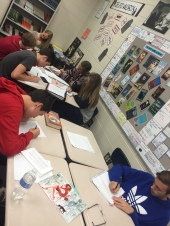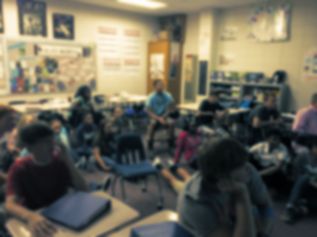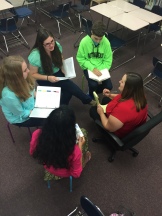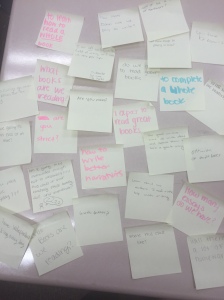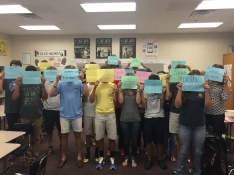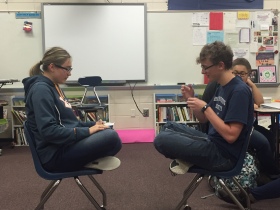 I’m at the Georgia Council Teachers of English Conference (#gcte16) this weekend (more to come on that next blog post). As I was telling my students yesterday, I was going to be out for a conference, I had an idea. I asked them to write what advice they would give if they were speaking to a room full of English teachers.
I’m at the Georgia Council Teachers of English Conference (#gcte16) this weekend (more to come on that next blog post). As I was telling my students yesterday, I was going to be out for a conference, I had an idea. I asked them to write what advice they would give if they were speaking to a room full of English teachers.
That’s it.
It was one of those on the spur-of-the-moment ideas—just meant for me to see what they thought was important. But as I began to read them, I realized the power in what they had to say, and I wanted to share.
Here are a few of their responses for your enjoyment and reflection. (I’ve only edited for clarity or to remove personal information.)
- Don’t kill good books by overloading them with assignments.
- We’re all young people trying to find ourselves. Nothing hurts more than to hear or feel that our opinions don’t matter. Let us know that our opinions count and you’ll be amazed at how many people raise their hands when questions are asked.
- English teachers need to know that not all of us have time to read but still love to read.
- Some students are introverts, so I think school should be open to different personalities rather than having everything to the advantage of extroverts. I think there should be more ways to showcase your thoughts without having to embarrass yourself.
- We sit the whole day listening to teacher after teacher. Most students would like a change in routine. My advice is to not always talk and we listen, change things up a bit.
- Reading is amazing and we need more ways to get involved, such as book talks and more time to really enjoy books!
- Literature is a blessing. It helps us understand the meanings of life and many students neglect that. Help make literature interesting so students don’t take it for granted.
- The books we are forced to read only appeal to a small minority of us dependent upon the book. I hated Of Mice and Men and loved Fahrenheit 451. Other people had different opinions. Since you can’t make everyone happy reading the same material, allow them to pick the book they read. It’s more difficult to grade but it produces better writing because students actually care. Also, let students pick their own writing prompts when analyzing literature. Everyone has unique thinking when they read the text, so they can best come up with an essay displaying their actual thoughts if they’re allowed to. Prompts limit thinking.
- Teach by example and give choices.
- We don’t come to school knowing how to write a perfec
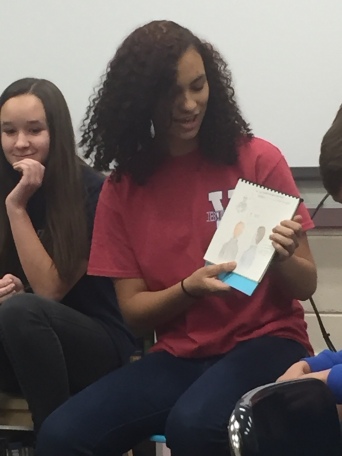 t paper. We need step-by-step guidance and useful tips in order to write successfully.
t paper. We need step-by-step guidance and useful tips in order to write successfully. - Allow students to rewrite papers so we can learn from our mistakes.
- Remember that students have other classes and homework, so don’t give too much homework because they can become overloaded.
- Sitting in groups everyday helps me brainstorm and ask questions with other students.
- Writing a paper with a bod prompt is miserable. Choices are good and good choices are great. Writing a paper about a topic you don’t hate is much more enjoyable.
- Show students that you are willing to put in the same amount of work as you assign your students. I know I would stay up to 5 am if necessary to write a great paper or create a meaningful project if I know the teacher puts in the same effort to grade and give feedback on my work.
- Give students room to be creative in their writing.
- I really enjoy learning so sometimes I feel like if we rush through lessons or books the importance of learning is no longer there and it is as though teachers are more concerned with meeting the deadline than actually getting us to learn.
- We’re not professional writers and you’re going to have to help us.
- We like to read and write about what we actually want to write and read about. It is no fun being forced on books that bore us.
- Teach advanced concepts but use simple vocabulary. We want to learn but sometimes it is hard for us to understand.
- To really teach us it is so important to give us time to get things done. Without time our work won’t be good.
- Teachers must let students read individual novels more.
Bonus Read: Amy is always challenging. Many of the things I try in my classroom are sparked by her honest reflections of her own classroom. This post titled, “Choice Doesn’t Necessarily Mean Personal Connection: A reflection for a do-over,” is no different. I think any teacher who has every tried choice or wants to try choice needs to read this.

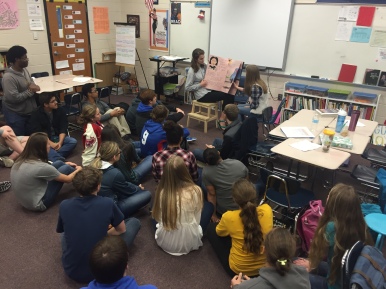 I took a hiatus from my blog during January to work on my dissertation. My chair told me I needed to have a complete draft by the end of January to graduate in May. I didn’t make the deadline. (I am now shooting for completion by April to graduate in July.)
I took a hiatus from my blog during January to work on my dissertation. My chair told me I needed to have a complete draft by the end of January to graduate in May. I didn’t make the deadline. (I am now shooting for completion by April to graduate in July.)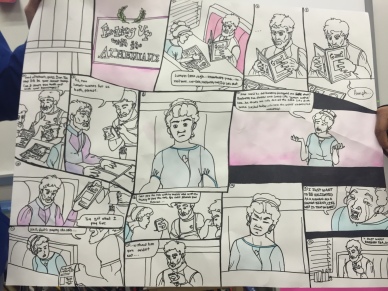 bluntly put, failed at a lesson or unit? Reflect, self-assess, make notes and adjustments, learn, and do better.
bluntly put, failed at a lesson or unit? Reflect, self-assess, make notes and adjustments, learn, and do better.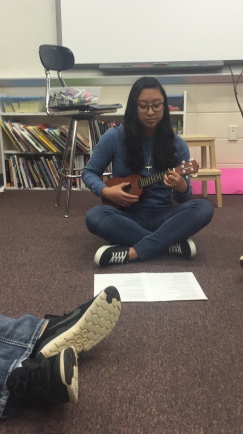 espearean plays.
espearean plays.
 attended last year. They talked about having guests come in for a debate panel to give students an authentic audience. I’ve talked about my quest for authentic class experiences since then in another
attended last year. They talked about having guests come in for a debate panel to give students an authentic audience. I’ve talked about my quest for authentic class experiences since then in another 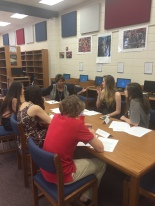 But what I might be most proud of was listening to students and the guests talk after the speeches were all delivered. The students asked questions, the guests shared personal stories and bits of wisdom. There was laughter, and as Lester Laminack says, if there isn’t laughter, there isn’t learning.
But what I might be most proud of was listening to students and the guests talk after the speeches were all delivered. The students asked questions, the guests shared personal stories and bits of wisdom. There was laughter, and as Lester Laminack says, if there isn’t laughter, there isn’t learning.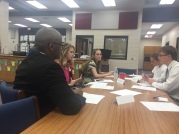 discussion, and I confessed I didn’t. The first time doing this, I hadn’t thought that it might go faster than my carefully planned out schedule. After I realized we had some time at the end, I asked the students to learn as much as they could from the guests while we had them here. And that’s what they did. In a way that came naturally from a curiosity and a quest for knowledge. What students learned yesterday was more than just about public speaking. They learned a little life. And I’m so thankful for all those who had a part in that.
discussion, and I confessed I didn’t. The first time doing this, I hadn’t thought that it might go faster than my carefully planned out schedule. After I realized we had some time at the end, I asked the students to learn as much as they could from the guests while we had them here. And that’s what they did. In a way that came naturally from a curiosity and a quest for knowledge. What students learned yesterday was more than just about public speaking. They learned a little life. And I’m so thankful for all those who had a part in that.












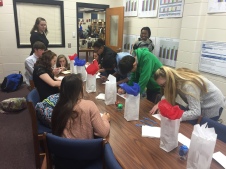 hospitality room for the guests, greeted the guests, and directed as needed. They also made thank you cards.
hospitality room for the guests, greeted the guests, and directed as needed. They also made thank you cards.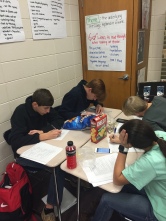 This week all my students are participating in writing boot camp during class. What makes writing boot camp different than just a week of writing instruction? It’s very focused. It’s intense. It’s about the mindset.
This week all my students are participating in writing boot camp during class. What makes writing boot camp different than just a week of writing instruction? It’s very focused. It’s intense. It’s about the mindset. has to feel different from the other weeks in class; it has to be special. It may be that students are allowed to bring in snacks/drinks or spread out on the floor. It may be that all instruction is focused on this type of writing. It may be that music will be playing while they write.
has to feel different from the other weeks in class; it has to be special. It may be that students are allowed to bring in snacks/drinks or spread out on the floor. It may be that all instruction is focused on this type of writing. It may be that music will be playing while they write. improvements.
improvements.

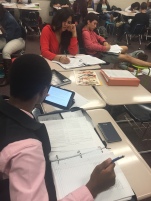 Monday
Monday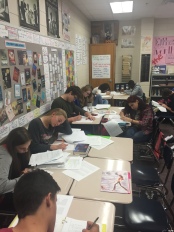
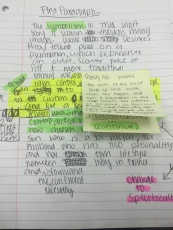 Friday
Friday